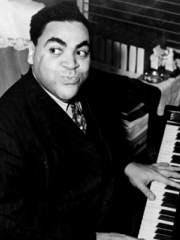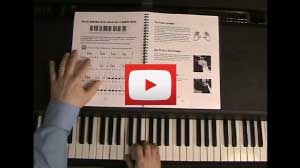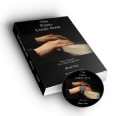Stride Piano Masters:
James P. Johnson, Willie "The Lion" Smith and Fats Waller
The stride piano masters took the left hand pattern of ragtime, added blue notes, swing eighth notes, and improvisation to create a new style. The stride piano masters had great technical skill based on training in the European classics. Stride was a New York based music form, played by solo pianists in bars, rent parties and sometimes in houses of ill repute. Often these giants of piano jazz would engage in "cutting contests," impromptu competitions to see who could play the fastest, most intricate music.
James P. Johnson, 1894-1955
James P. Johnson was often credited as the "inventor" of stride piano. By the age of 8, he was playing in a neighbor's brothel, not really understanding what was going on. By his early teens, he had figured it out, and by that time he was composing orchestral works. He practiced almost non-stop, playing the classics as much as the ragtime that was the popular craze of the day.
He was making piano rolls by the mid-teens, at first mostly ragtime. By the late teens he was getting a little looser, adding more blues and improvisation. The piano rolls would prove to be a major influence on some up-and-comers including Duke Ellington and Fats Waller, both of whom would watch the keys, trying to copy what Johnson was playing.
As swing music started to eclipse stride jazz, there were less opportunities for solo pianists. Johnson started to compose more serious, classical music. Carnegie Hall presented a concert of his works in 1945.
Prior to that, in 1940, he suffered a minor stroke, which slowed his playing. Another stroke in 1950 left him bedridden until his death in 1955.
James P. Johnson will be remembered for his compositions "Carolina Shout" and "Charleston," perhaps the biggest dance hit of the 20's. He will also be remembered for being the first of the stride piano masters.
Willie "The Lion" Smith, 1897-1973
Willie "The Lion" Smith came into the world as William Henry Joseph Bonaparte Bertholoff Smith. He had a big name and a bigger personality. His signature was his big cigar and derby hat. Willie had a fighter's personality at all night jams and rent parties. He would intimidate whoever was at the piano, get them to move out of the way and show them up.
Like James P. Johnson, he had a ragtime influence with a classical training. He had a large classical repertoire at a young age, but tap danced on street corners in Newark, N.J., to raise money for his family. He heard Jelly Roll Morton in 1911, who made a huge impression on him. He met and befriended James P. Johnson in 1914, and the two influenced each others' playing. Willie served two years in France during WWI, and came back to New York ready to take over the city's pianos.
Willie's style was not as technically advanced as some of the other stride piano masters, but his flamboyant style and fighting attitude made up for any deficiencies. He had a lighter touch, and his music was more compositional than improvisational.
He recorded through the 30's and later played with Dixie revivalists. Willie enjoyed being the last remaining stride piano master up until his final days in 1973.
Thomas "Fats" Waller, 1904-1943

Fats Waller was born in Harlem, and learned music at an early age. Always overweight, he compensated by being the class clown. By age 15 he quit school to take a job as the organist in a silent movie house. By 1920 he was deep into the rent party scene, earning his living playing all-night parties.
James P. Johnson was his teacher and friend, and Johnson got Fats a gig at a club, replacing Willie "The Lion" Smith. Johnson also helped Fats get a job with the QRS Piano Roll company, making 22 rolls between 1922 and 1927. He collaborated with Johnson on a revue called Keep Shufflin' in 1927.
Fats was a great comedian and entertainer, and was perfect for the new medium of radio. He had is own show in 1929. He performed mostly his own songs, but made hilarious quips, but always playing excellent piano.
Fats Waller lived a life of excess. He could party all night, and eat five steaks in a sitting. He wrote over 500 songs including "Keeping Out Of Mischief Now," "Ain't Misbehavin'," and "Honeysuckle Rose." Many of those songs he sold for a pittance to pay alimony debts or just for hamburgers. Failure to pay alimony landed him in jail for 6 months in 1928. It is rumored that he wrote and sold "I Can't Give You Anything But Love" and "On The Sunny Side Of The Street."
Of the stride piano masters, Fats Waller had a bigger personality than Willie "The Lion" Smith, could play with more technique and finesse than James P. Johnson, and took stride piano farther, incorporating popular song forms into his music. But his body could not keep up with his huge appetite for life. He died on a train ride home from Hollywood in 1943 at age 39.
Start Playing Piano Today with the Piano Guide Quick Start Course!
Easy to follow step-by-step lessons designed for adult beginners. The next best thing to private lessons!
What You'll Learn:
- Notes on the piano/keyboard
- Proper fingering
- C major scale
- Chords
- How to read music
- And much more!

Video lessons - watch as I play everything for you.

